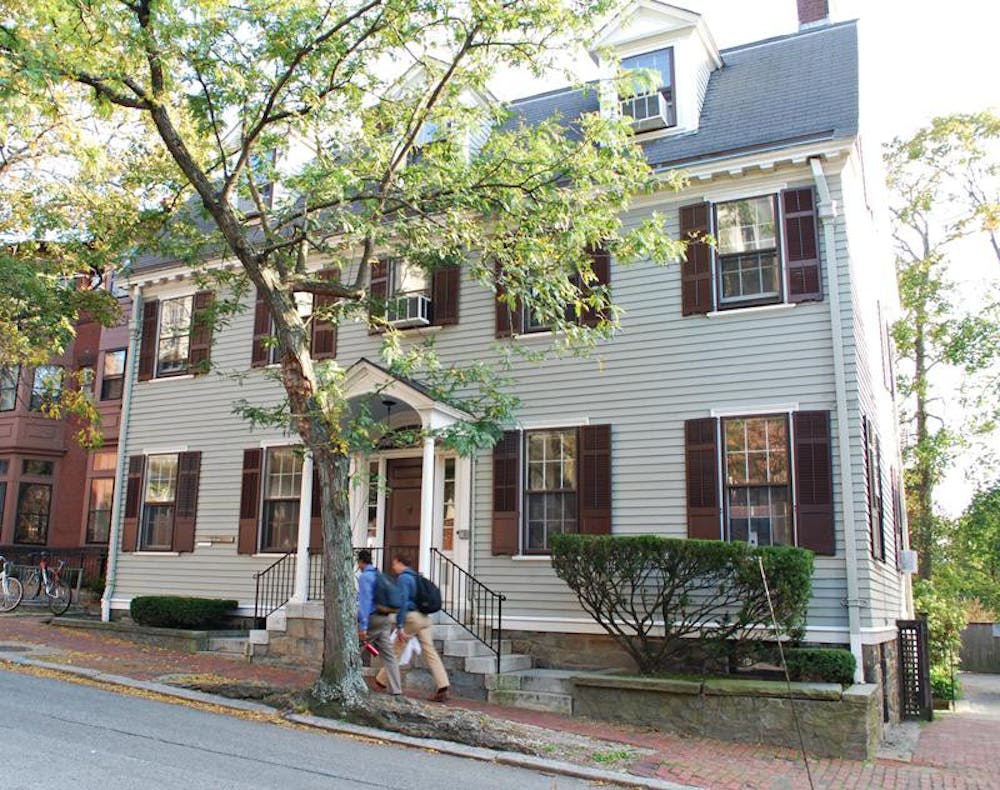Roger Nozaki MAT’89, director of the Swearer Center for Public Service and associate dean of the College for community and global engagement, will leave the University this week to work for the U.S. Department of Education, he told The Herald. Associate Director of the Swearer Center Kate Trimble will replace him as the center’s acting director.
Trimble previously served as acting director of the Swearer Center when Nozaki took a short-term post at the Department of Education for three months last summer, she wrote in an email to The Herald.
Nozaki will act as a policy adviser in the Office of the Under Secretary of the Department of Education, he said. He declined to comment on whether the role would be short-term or permanent.
“It was really a tough decision to think about leaving Brown once I got the offer,” Nozaki said. “But this new position really connects to the work with college access that I had been doing before Brown.”
“The U.S. Department of Education is lucky to have (Nozaki) and he will be greatly missed here at Brown,” Trimble wrote. “I’m looking forward to the role, and to continuing to move our work in the community forward.”
Over his nine-year tenure, Nozaki has played a prominent role in developing several new public service initiatives at the University, including the Program in Engaged Scholarship, the TRI-Lab and the Social Innovation Initiative.
Prior to coming to Brown in 2005, Nozaki served as executive director of the GE Foundation, the philanthropic branch of General Electric, and co-founded the Pathways to College Network, a group of national organizations working to boost college attendance among underrepresented groups.
Colleagues reflected on Nozaki’s commitment to enmeshing public service in education.
“Under his leadership the connections between service and scholarship have been strengthened,” wrote Margaret Klawunn, vice president for campus life and student services and interim dean of the College, in an email to The Herald.
Nozaki “helped Brown solidify its position as an institution committed to powerful social change,” wrote Klawunn, who worked closely with Nozaki in the dean of the College’s office and led the committee that hired him in 2005.
Nozaki’s vision for the Swearer Center drew on former President Howard Swearer’s original belief “that public service should be an integral part of a student’s Brown education,” said Alan Harlam, director of innovation and social entrepreneurship at the Swearer Center.
Last semester, Nozaki was instrumental in helping a faculty committee identify connections between the engaged scholarship theme in President Christina Paxson’s strategic plan and the Program in Engaged Scholarship, Harlam said. The program, which combines coursework with internships and research, is set to begin next semester.
Nozaki oversaw this year’s pilot of the TRI-Lab, an initiative in which students, faculty members and community partners collaborate to address social issues, Harlam said. This past year’s TRI-Lab focused on healthy early childhood development, and two different labs are set to launch next academic year — one centered on healthy food access and one focused on climate change.
The Social Innovation Initiative, which provides up to $4,000 and training to students starting social ventures, also benefited from Nozaki’s support, said Stanley Stewart ’16, a social innovation fellow.
“He really has set the groundwork for social innovation here at Brown,” Stewart said. “He set those foundations where they didn’t exist before for students.”
Looking beyond College Hill, Nozaki also helped connect the University to the Providence and global communities through service.
During his first few years at the University, Nozaki established the Brown chapter of the College Advising Corps, which enables recent Brown graduates to mentor low-income, first-generation students at urban public high schools across the state.
More recently, Nozaki helped spearhead the University’s partnership with Ashoka U, an organization that aims to encourage social innovation at colleges and universities, Trimble wrote. Brown was designated one of 24 national Ashoka U Changemaker Campuses in 2012 and hosted a global Ashoka U Exchange conference this spring that featured approximately 650 students, faculty members and social entrepreneurs from nearly 150 institutions and 40 countries.
In the classroom, Nozaki offered students a “fabulous experience” while co-teaching SOC 1870A: “Investing in Social Change” with Associate Professor of Sociology Ann Dill, said Marguerite Joutz ’15, who took the course.
“He was an invaluable resource as an educator” given his past experience with philanthropic foundations, Joutz said.
Though Nozaki is still listed as the instructor on Banner, Trimble is set to co-teach the class this fall, Joutz added.
Nozaki’s departure comes at a time of extensive high-level administrative turnover. Dean of the College Katherine Bergeron left the University in December to become president of Connecticut College, while Provost Mark Schlissel P’15 will assume the presidency of the University of Michigan July 1. Neither permanent successor has been announced.
A previous version of this article incorrectly stated that Nozaki co-taught "Investing in Social Change" with Professor of Political Science and Slavic Languages Linda Cook. In fact, it was with Associate Professor of Sociology Ann Dill. The Herald regrets the error.

ADVERTISEMENT




